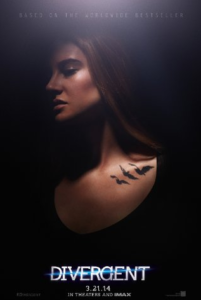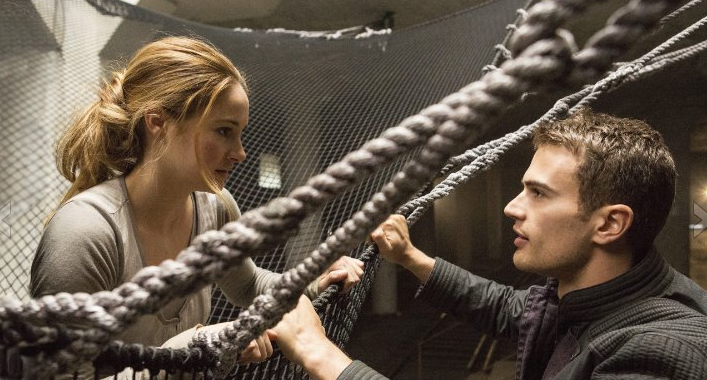
 Let’s get this out of the way from the beginning: “Divergent” is not as good as “The Hunger Games.” And it lacks the soap opera cheese of “Twilight.” In fact, it might be the flattest and most unengaging YA epic yet.
Let’s get this out of the way from the beginning: “Divergent” is not as good as “The Hunger Games.” And it lacks the soap opera cheese of “Twilight.” In fact, it might be the flattest and most unengaging YA epic yet.
Like a Great Illustrated Classics adaptation of a lesser comic book, “Divergent” delivers a dystopian plot with mechanical precision but lacks the nuance and art that usually marks outstanding source material. Not to tar Veronica Roth’s best-seller, but I’ve not heard a single avid YA reader rave about her strong writing. Instead, focus is often on the plot and the central theme, which by now is so well-known to fans of the genre that it will be difficult for a new writer to achieve Roth-like success in the future. Still Roth’s series can’t be shoved aside. She must be doing something right given her massive following and trilogy of best-sellers. Remember, critics sneered at JK Rowling’s tomes and see where that ended up.
“Divergent” is a post-apocalyptic tale. Following a great war, new societies evolved and the action here takes place in the walled city of Chicago. Inside a protective electrified barrier, order is maintained by dividing people into factions, each serving a particular purpose. Our hero, Tris (Shailene Woodley), is a member of humble ruling class but yearns to be a part of an adventurous faction of warriors charged with protecting their world. As she reaches the age of majority, Tris, will have to choose a faction. But will she make the right decision?
There are two main problems with “Divergent:” 1. It is unengaging, and 2. The story is too simplistically presented and resolved.
Unlike the best examples of the YA genre, director Neil Burger’s adaptation of Roth’s novel spends too much time introducing the plot elements and not enough time personalizing its heroine. Compare “The Hunger Games” where time is taken to properly introduce Katniss (whose wonderful surname was “Everdeen”) and her family showing us a glimpse of what makes her sad and unfulfilled. In “Divergent,” Beatrice tells us in a narration all about her world. It is this lazy narration device that undercuts some of the suspense in that she’s telling when the film should be showing.
The shame is that Woodley and the rest of the cast are very capable actors and should be able to transfer emotions to the viewer. But I felt little as the plot mechanically marched forward. And the script never seems to give us an “ah, ha” moment. Remember the epiphanies that made both “Hunger Games” films so effective. Nothing, and I mean not one moment in “Divergent” comes close to matching the emotional intensity of “The Hunger Games.” It is a film more interested in getting to the finish line than making us feel anything. “Divergent” starts cold and just seems to get colder.
Also a disappointment is the simplistic way that this initial installment (one of a proposed trilogy) is presented and resolved. “Divergent” lacks credibility from start to finish. When Tris joins the warrior faction, her training is all one note—lots of risk-taking and broad physicality with little strategic or sophisticated military training. The idea, I suppose, is for the faction to be made up of mindless brutes, but also, ones that carry weapons and roam the walled city with no restrictions. For example, in one military training exercise, Tris climbs a ferris wheel to gain better perspective. Her superior, Four (Theo James), who is training her, seems surprised by this obvious decision immediately recognizing that it is a good idea. Frustrated, it made me question Four’s leadership. He apparently isn’t very well trained. The film is replete with examples like this one eventually dumping us into a really weak concluding sequence that proves to be utterly embarrassing for Kate Winslet, who has to deliver some of the poorest dialogue of her illustrious career.
For me, while watching “Divergent,” I spent too much time trying to reconcile leaps in logic. After excusing the Cliff’s Notes political science setup, the viewer is expected to buy that this future world is one where energy seems to be in plentiful supply, and computers and other advanced technology are readily available. But it is also a sexless place where almost everyone is beautiful but are able to suppress their carnal impulses. At least, the “Twilight” films got away with gaps in logic by piling on ample helpings of soapy cheese. “Divergent” by contrast, plays everything straight and serious to a far-fetched fault.
While fans will certainly embrace this initial outing, for “Divergent” to succeed as a franchise, it will have to shift its emphasis away from plot and focus more on character.

